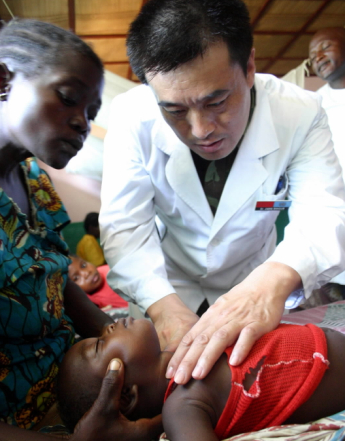| 
Kenyan businessman David Njagi, 34, is a big fan of Chinese doctors, visiting them for a host of ailments. “They are very professional in their work. They are also friendly. I always pay less for the services and that is very motivating,” he said. Njagi adds that his father and mother also seek Chinese medical services as they are reliable. Chinese hospitals and related facilities are flourishing in Kenya as demand for medical services in both urban and rural areas continues to rise.
With the movement of Kenyan doctors to other countries, there is an increase in foreign doctors [coming to Kenya]. With the increase in treatment of certain diseases, doctors with different specialties are also in greater demand, said Daniel Yumbya, CEO of the Kenya Dentists and Medical Practitioners Board.
Exodus of doctors
“A lot of them [foreign doctors] will continue to be licensed as long as they are qualified. We are losing our own doctors for better opportunities abroad and we want the best medical services for the people. As ailments like diabetes, liver cancer and kidney disease continue to increase, the demand for specialized doctors also increases,” said Yumbya.
He said Kenya is losing about 200 doctors in different medical specialties each year, a figure that is clearly causing much concern. “We are losing dentists, gynecologists, surgeons, pediatricians, physicians and pharmacists at alarming rates and we are now seeing an increase in very talented and experienced Chinese doctors,” Yumbya told ChinAfrica.
Kenyan law requires that any medical facility or practitioner be registered with the country’s Dentists and Medical Practitioners Board. The board is registered under the Kenyan Ministry of Health. “The demand for maternal health has seen many Chinese doctors come into the country and get licenses to practice medicine. The country hopes to reduce the high rates of maternal deaths. The Ministry of Health reports that every two hours a woman dies during child birth or pregnancy,” Yumbya said. He added that the government agency will continue to register Chinese doctors as they are very professional, friendly and concerned on matters related to public health.
The increase in Chinese doctors comes at a time when China has pledged to invest more than $6 billion in health services in East Africa over the next six years, according to Kenya’s Ministry of Health.
“A lot of the hospitals are Chinese owned and Chinese staff are used a lot in various services, but there is also an increase in [traditional] Chinese medicine in the hospitals. The use of the [traditional Chinese] medicine has to be licensed by the Pharmacy and Poisons Board under the Ministry of Health,” Kenya’s Health Cabinet Secretary James Macharia told ChinAfrica.
He said Chinese doctors are operating not only in Kenyan government hospitals, but also in fully owned and operated Chinese facilities in the country. “There is great demand for experienced doctors in the country I may say,” said Macharia.
There are currently over 3,000 registered Chinese doctors in Kenya, according to official government figures. That number is set to increase this year as many Kenyan medical professionals seek greener pastures abroad. Those pastures include the United States, United Kingdom, Mexico, India and Australia. The average monthly salary for a government physician in Kenya is just $700 compared with about $4,000 starting salary in the European Union.
Less costly
“Most of the Chinese doctors have private clinics; there are about 218 all over the country. They are cheap depending on the service that you may need,” said Macharia. He estimates that based on studies conducted, on average the Chinese facilities are 13 percent cheaper than Kenyan hospitals. “But if you visit a private clinic, you will get higher rates,” said Macharia.
China has in recent months given medical aid to Kenya in HIV/AIDS services. So far, the country’s professionals are providing counseling and testing in its facilities and partnering with the government to distribute free condoms in prevention. “China has also invested a lot in birth control programs, in a few years, the influence of which will begin to be felt,” said Macharia.
Studies done in Kenya show that there is also a need for gynecologists in the country as reproductive health problems continue to increase. The country is in need of about 500 experienced gynecologists who specialize in infertility. “There are many cases of increasing infertility in the country among married couples. Many are now opting for assisted-births related technologies such as invitro fertilization. The problem is that there are not many doctors who are experienced or specialized in this technique,” said Macharia.
It is estimated that 34 percent of married couples in Kenya cannot have children, hence the need for doctors qualified in the specialty. “Chinese medicine has helped me and my wife have a child,” said Njagi.
Apart from Kenya, China is now also looking to Uganda, Tanzania, Burundi and Rwanda
as countries to increase its medical investments.
(Reporting from Kenya) |